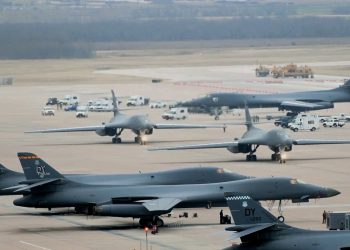Rio De Janeiro: Brazilian President Luiz Inacio Lula da Silva’s stated plans to award a multi-billion-dollar fighter jet contract to France ran into turbulence on Wednesday amid pressure from rival bidders and Brazil’s
air force.
The selection process “has not yet finished,” Defense Minister Nelson Jobim said in a statement late Tuesday.
Brazil “will continue with negotiations with the three participants; they will be followed up and the proposals potentially reshaped,” he said.
That position ran counter to official statements by Lula and his government on Monday — during Brazil’s Independence Day attended by French President Nicolas Sarkozy — to the effect that the deal had all but sealed in favor of France’s Rafale jets made by Dassault.
“President Lula has announced the decision by the Brazilian side to begin negotiations with the GIE Rafale to acquire 36 Rafale combat aircraft,” Lula and Sarkozy said in a joint statement on that day.
Brazilian Foreign Minister Celso Amorim specified that the decision to extend the talks with Dassault “was not adopted in relation to the other two” bidders, Boeing of the United States and Saab of Sweden.
A Rafale spokesman at the time told AFP that “President Lula’s declaration clearly means that the Rafale has won the competition.”
But Brazil’s air force, which had not yet submitted its painstakingly detailed analysis of all three contenders to Lula, objected to being sidelined, analysts said.
“I think our president got a bit ahead of himself,” said one Brazilian military analyst, Alvaro Pinheiro.
“The problem is that the final report (by the air force) was to be submitted at the end of October,” he said.
Nelson During, a respected Brazilian military expert, agreed.
“The military is complaining that this leaves it little room to negotiate the two contracts: the aviation system (the jets) and the weapons systems (missiles and bombs),” he said.
“The two president have created some confusion and now we’re going to see what the military wanted to avoid at all cost: a debate in the media between lobbies and interest groups.”
By plumping for the Rafale jets before the tender procedure was complete, Lula was short-circuiting the Brazilian congress’s defense committee, to the fury of party leaders, he explained. Jobim’s backtracking was to placate them.
Nevertheless, he said, because it appeared that a political deal had been struck directly between Lula and Sarkozy, “it is very difficult to reverse this.”
Boeing, which was offering its F/A-18 Super Hornet fighter, and Saab, talking up its Gripen NG aircraft, both emphasized that they had not been notified that the Brazilian tender had been settled in favor of Dassault.
The US government, which authorized the export sale of the F/A-18, said in a statement through its embassy in Brazil: “We understand that a final decision has not yet been made regarding the winner of the contract.”
The F/A-18, in its opinion, “is the best in comparison to its competitors,” it said.
It also objected to Lula’s explanation that he preferred the Rafale because of France’s offer to share all the technology that goes into the jet so Brazil could one day build its own fighters.
Approval by the US Congress “means that (the) US government’s approval of the transfer to Brazil of the advanced technologies associated with the US government’s offer of the F/A-18 Super Hornet is final,” it said.
“The United States welcomes the opportunity to enter into open negotiations,” the statement said.
Saab’s team in Brazil was still digesting the developments and would issue a media statement later, a spokeswoman, Bruna Dias, told AFP.
Asked whether there was confusion in the Swedish company over the different messages from Brazil’s government, she replied “yes.”
Dias added “we haven’t had anything” in the way of official contact from Brazil’s government about whether the fighter tender was closed or negotiations were continuing.
The contract to supply Brazil’s air force with fighters it will use for the next three decades is worth an estimated four billion to seven billion dollars, making it one of the biggest defense tenders in the world.
Brazil already has close military ties with France, having bought a second-hand aircraft carrier from it in 2000 and last December striking a 10-billion-dollar deal to buy five submarines and 50 helicopters.
Lula’s government has emphasized since the fighter jet tender was launched early 2008 that the priority was technology transfer, so Brazil could become a sophisticated industrial power in its own right and have the means to protect its vast natural resources.








